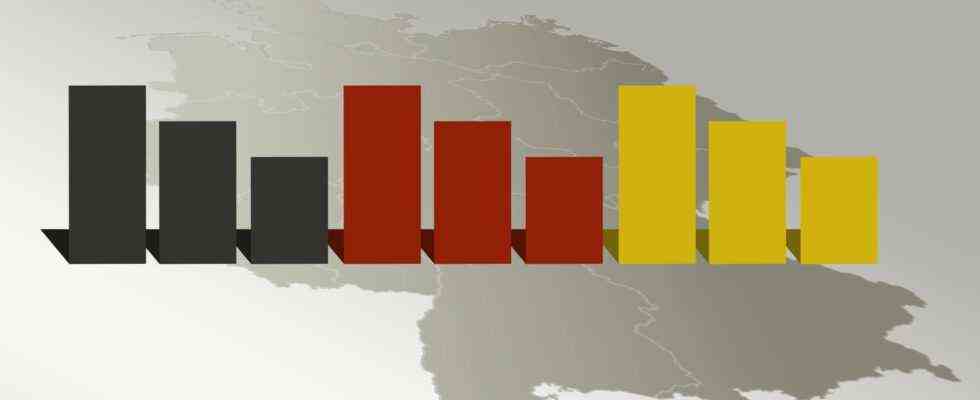Status: 04.11.2021 6:00 p.m.
Not even half of the Germans were in ARD Germany trend of August for compulsory vaccination against the coronavirus. Now 57 percent voted for it. There is particularly great concern about unvaccinated children and the elderly.
With the increasing number of infections, the corona pandemic is moving forward again on the political agenda. Citizens are not so afraid of infecting themselves: only one in four is currently worried in this context.
Rather, it is about children and the elderly: 57 percent worry that children who have not yet been vaccinated could become infected with the virus. And 62 percent fear that older people will get seriously ill with Corona.
A similar number (57 percent) fear that because of the infection, public life could be restricted again in the coming weeks. 58 percent are worried that the health system in Germany could reach its limits.
57 percent are in favor of vaccination light
A majority of 57 percent are in favor of a general compulsory corona vaccination, 39 percent are against. In August of this year, the picture was still divided: At that time, 46 percent were in favor of a general vaccination requirement, 50 percent against.
A general compulsory vaccination finds the greatest support in the ranks of Union (73 percent) and SPD (71 percent). The supporters of the FDP (53:42 percent) and the Greens (56:42 percent) also outweigh the approval, while the left-wing voters (45:55 percent), but above all the AfD voters (22:71 percent), do The majority reject general compulsory vaccination.
If you ask about compulsory vaccination for certain occupational groups, such as in the health and care sector, then significantly more are in favor, namely three quarters (74 percent) of the respondents.
Almost every second thinks restrictions are appropriate
Almost every second person (46 percent) thinks the currently applicable Corona restrictions are appropriate, which is 14 points less than at the beginning of October. For almost one in four (23 percent, -2) they are currently going too far. Three out of ten Germans (29 percent) say that the measures currently do not go far enough – that is 16 points more than in the previous month.
Great need for action on climate protection
The Germans’ view of the issue of climate protection is quite clear: 83 percent currently see a very large or large need for action. A minority of 16 percent, on the other hand, sees little or no need for action. So while the majority want to see action, at the same time people doubt that the UN climate conference in Glasgow will produce them.
82 percent of Germans are not or not at all convinced that the international community can cope with the problems that arise from climate change. That is three points less than in December 2018, than that ARD Germany trend asked this question on the occasion of the UN climate conference in Katowice, Poland.
Too much focus on own interests
Those surveyed who expressed their skepticism see the main obstacle to more effective global climate protection if the states are too strongly oriented towards their own national interests (85 percent). A good half (56 percent) see international climate protection being thwarted by the fact that the states shy away from overly harsh cuts. Hardly less (52 percent) consider short-term thinking and the long-term nature of climate threats to be decisive for insufficient progress in global climate protection. In contrast, only 31 percent rate the complexity of climate change as a central hurdle.
Two thirds of those surveyed currently want politicians in Germany to do more to protect the climate. One in five thinks that politicians are already taking adequate care of climate protection; 9 percent, on the other hand, believe that politicians should be less involved in this area.
A majority of all party supporters express the demand that climate policy in Germany should be acted more strongly – with the exception of AfD supporters: 24 percent of them would like to be more involved in climate protection, 29 percent consider the issue to be treated appropriately and 41 Percent want politics to do less when it comes to climate protection.
Sunday question: SPD increases, Union loses
A good month after the general election, the Union is in a low mood, while the parties to a possible traffic light coalition are making slight gains. In an election next Sunday, the SPD would come to 27 percent (election result on September 26, 21: 25.7), the Union would be 21 percent (24.1). The Greens would get 16 percent of the vote (14.8) and the FDP 13 percent (11.5). The AfD would be 10 percent (10.3) and the left 5 percent (4.9). All other parties together would have 8 percent.
Investigation facility
Population: Eligible voters in Germany
Survey method: Random-based telephone * and online survey
* of which 60 percent landline, 40 percent mobile
Survey period: November 2nd to 3rd, 2021
Number of cases: 1,329 respondents (869 telephone interviews and 460 online interviews)
Weighting: according to socio-demographic characteristics and
Reminder about voting behavior / Sunday question with separate weighting
Fluctuation range: 2 * to 3 ** percentage points
* with a share value of 10 percent ** with a share value of 50 percent
Implementing institute: infratest dimap
The results are rounded to whole percentages in order to avoid false expectations of precision. This is because fluctuation ranges must be taken into account for all representative surveys. In the case of a survey with 1000 respondents, these are around three percentage points for large parties and around one point for smaller parties. In addition, the rounding error is significant for small parties. For these reasons, no party is shown under three percent in the Sunday question.

